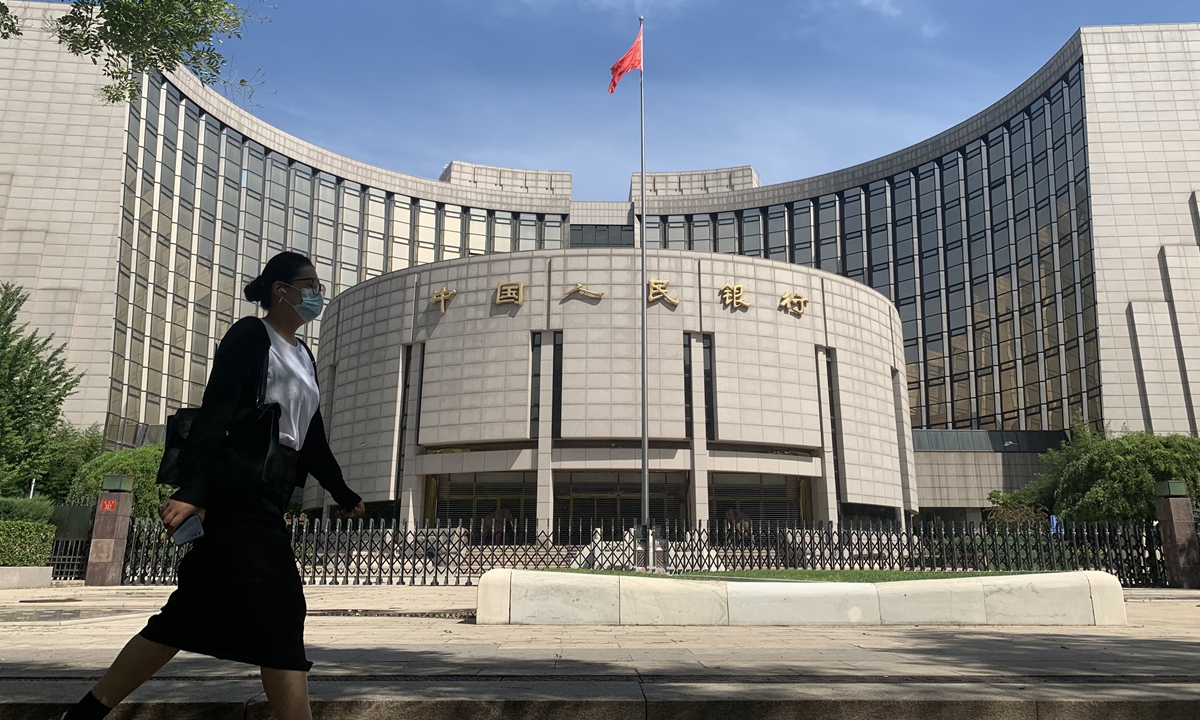
A view of the PBC building in Beijing Photo: VCG
China's central bank on Wednesday vowed to strengthen risk disposal mechanisms, fend off systemic risks, and enhance its sense of crisis and "fighting spirit." It also called for proper responses to containment and suppression by the US and other Western countries.
The calls came at key meetings following the just-concluded two sessions, on top of the recent collapse of US-based Silicon Valley Bank triggering concern about a potential global financial crisis.
The messages from these meetings, along with the reform of China's financial regulatory regime, signal that financial stability and defusing risks are highly important this year amid external and domestic factors, experts said.
At its annual meeting on financial stability held recently, the People's Bank of China (PBC) pointed out that the overall financial situation in China is stable, and it stressed continued efforts to prevent and defuse financial risks in its 2023 work, according to a release of the central bank posted on Wednesday.
The PBC said that the overall financial market is running smoothly and risks are under control. Large banks with excellent ratings are the "ballast stone" of China's financial system. Reforms of a few problematic small and medium-sized financial institutions have achieved important progress, and illegal financial activities have been effectively curtailed, it said.
The meeting also vowed to "balance security and development", strengthen mechanisms to prevent and defuse risks, and resolutely safeguard the bottom line against systemic financial risks.
Efforts should be made to strengthen the early detection, correction and handling of financial risks and promote the establishment of working mechanisms to maintain financial stability, the central bank said.
The PBC will improve legislation on financial stability and related guarantee fund system, and improve the role of deposit insurance, it said.
The meeting is of great significance and signals the government's priority on financial stability, Dong Shaopeng, a senior research fellow at the Chongyang Institute for Financial Studies at Renmin University of China, told the Global Times on Wednesday.
On one hand, the spillover effects of the Fed's aggressive rate hikes, represented by the recent failure of Silicon Valley Bank, are still affecting other countries, including China.
On the other hand, debt from some developers poses financial risks, especially for small and medium-sized financial institutions, Dong said.
Promoting consumption also promotes credit, and efforts should be made to monitor and control the excessive expansion of credit, loans and other risks in the process of growth, Dong said.
In a separate meeting mentioned in another release posted on Wednesday, which focused on key messages from the two sessions, the PBC said it will accurately and forcefully implement a prudent monetary policy, grasp the pace of credit extensions, maintain reasonable growth of money supply and credit, and make every effort to stabilize growth, employment, and prices.
Support, including bond financing for small and micro-sized private enterprises, will be further strengthened, to address the financing problems in specific parts of the economy, the bank said.
It also vowed to enhance its sense of crisis and "fighting spirit," while calling for efforts to properly respond to containment and suppression by the US and other Western countries, according to PBC.
As the US is stepping up efforts to suppress China's technology sector, it is also possible that the attack on China may extend to the financial sector, Dong said.
"The central bank, which plays an important role in controlling and implementing monetary policy, should not ignore these potential risks and should make early preparations," Dong said, adding that when large Chinese financial institutions engage in international financial activities, they should be aware of the risks of potential financial disruption and interference by the US.
Financial stability was particularly emphasized during the two sessions amid rising external uncertainty.
China will set up a national financial regulatory administration. Directly under the State Council, the cabinet, the proposed administration will be in charge of regulating the financial industry, except the securities sector.
It will be established on the basis of the China Banking and Insurance Regulatory Commission, which will not be retained, and certain functions will be transferred to the new administration, according to the Xinhua News Agency.
The establishment of the administration will help to strengthen financial risk identification and stability, experts said.
It also reflects a reform of China's financial system, which is aimed at better day-to-day financial supervision, and faster and more accurate responses to sudden financial events, Zhao Qingming, a Beijing-based veteran financial expert, told the Global Times on Wednesday.
"Sudden financial events reflect accumulated contradictions. Therefore, daily supervision ... is very important," said Zhao.




